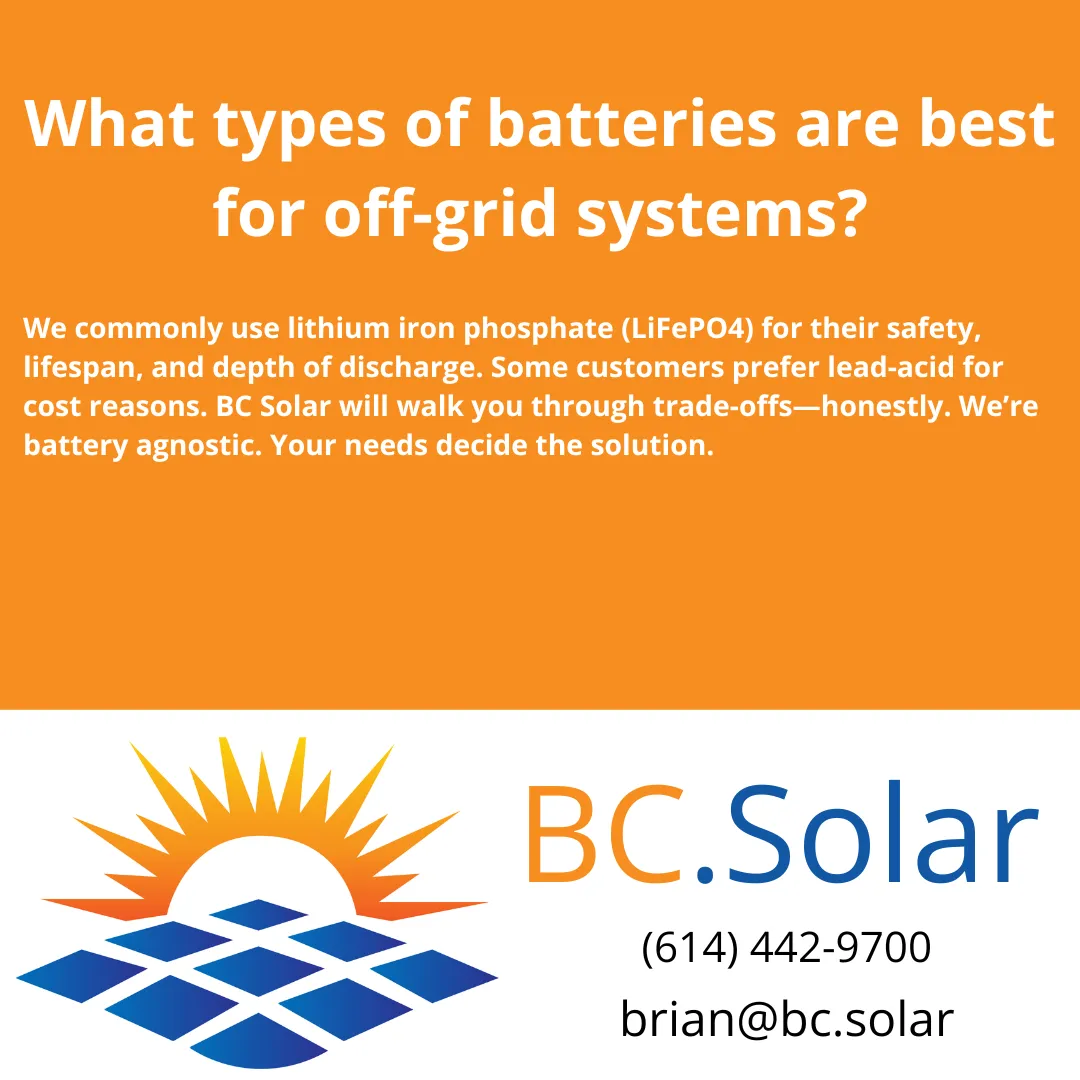
What types of batteries are best for off-grid systems?
What Types of Batteries Are Best for Off-Grid Solar Systems?
If you're going off-grid in Columbus or anywhere in Ohio, your solar battery choice matters just as much as your panels. At BC Solar, we don’t push a brand or battery type. We walk you through your options and help you pick the right one — based on how you actually live and use energy.
Here’s what we’ve seen work best in real-world off-grid systems:
🔋 Top Battery Options for Off-Grid Solar
1. Lithium Iron Phosphate (LiFePO₄)
This is our go-to for most homeowners and business owners wanting maximum efficiency and peace of mind.
Pros:
Long lifespan: Often lasts 10+ years, even with deep cycling.
High depth of discharge (DoD): You can use 80-90% of the battery’s capacity without damage.
Low maintenance: No watering or venting needed.
Excellent safety profile: Doesn’t overheat or catch fire like older lithium chemistries.
Cons:
Higher upfront cost: But the long lifespan often makes up for it.
Not ideal for freezing temps unless properly insulated or climate-controlled.
We frequently use lithium systems with Sol-Ark inverters, especially when backup power is critical — no flicker, no fuss.
2. Lead-Acid (Flooded, AGM, or Gel)
Some customers still choose lead-acid for cost reasons, especially for cabins or seasonal off-grid systems.
Pros:
Lower upfront cost
Widespread availability
Decades of field history
Cons:
Lower DoD: Usually only 50% usable to maintain lifespan.
Shorter life: Typically 3–7 years depending on care.
Higher maintenance (for flooded types): Requires regular water level checks and proper venting.
We’ll be honest — if you go this route, we’ll explain exactly what it takes to get your money’s worth and avoid early failure.
⚖️ Which Battery Should You Choose?
It depends on your answers to questions like:
How often will you cycle the batteries?
Are you living off-grid full-time or part-time?
Do you need backup for critical loads or full home coverage?
What's your budget — now and long-term?
At BC Solar, we’re battery agnostic. We don’t push a brand or chemistry just because it’s on our shelf. We design around your goals, your budget, and your real-world usage.
FAQs
Q: How long do off-grid solar batteries last?
A: Lithium batteries often last 10–15 years; lead-acid lasts about 3–7 years with good maintenance.
Q: Are lithium batteries safe?
A: Yes. LiFePO₄ (lithium iron phosphate) batteries have excellent thermal stability and built-in protections when paired with quality inverters.
Q: Can I add more batteries later?
A: With the right design — absolutely. That’s why we use modular inverters and explain upgrade paths from the beginning.
Q: Do you install off-grid systems in winterized or remote locations?
A: Yes. We've done systems for cabins, barns, and remote homesteads throughout central and southern Ohio. Off-grid is in our wheelhouse.
If you're considering off-grid solar in Columbus or the surrounding areas, let's have an honest conversation. You’ll walk away informed — and never pressured.
📞 (614) 442-9700
📍 BC Solar, 777 Busch Ct, Columbus, OH
🌐 https://bc.solar
